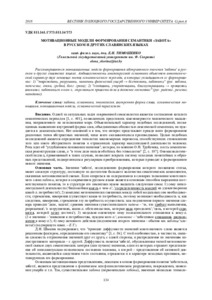Please use this identifier to cite or link to this item:
https://elib.psu.by/handle/123456789/22851Full metadata record
| DC Field | Value | Language |
|---|---|---|
| dc.contributor.author | Тимошенко, Е. И. | - |
| dc.date.accessioned | 2018-11-22T07:40:47Z | - |
| dc.date.available | 2018-11-22T07:40:47Z | - |
| dc.date.issued | 2018 | - |
| dc.identifier.citation | Вестник Полоцкого государственного университета. Серия A, Гуманитарные науки. - 2018. - № 10 – C. 134-138. | ru_RU |
| dc.identifier.issn | 2070-1608 | - |
| dc.identifier.uri | https://elib.psu.by/handle/123456789/22851 | - |
| dc.description | Motivational Models of the Formation of the Semantics of 'Care' in Russian and Other Slavic Languages E. Timoshenko | ru_RU |
| dc.description.abstract | Рассматриваются мотивационные модели формирования абстрактного значения 'забота' в русском и других славянских языках. Амбивалентность анализируемой семантики объясняет антонимический характер двух основных типов семантического перехода, в которые укладывается ее формирование: 1) ''повреждать, разрушать, наносить физический ущерб → беспокоить, заботить'' (рус. забота, попечение, опека, гребтá, болг. гриза); 2) "создавать, упорядочивать, благоустраивать → проявлять внимание, заботиться о ком-л., стремиться привести дела в должное состояние" (рус. радение, рачение, назидание).= The article is devoted to revealing of motivational models of formation of abstract meaning 'care' in Russian and other Slavic languages. The ambivalence of the considered semantics explains the antonymic nature of the two main types of semantic transfer, which corresponds its formation: 1) "to damage, to destroy, to cause physical damage → to bother, to care about"; 2)" to create, organize, improve → to pay attention, to take care of somebody, to strive to bring things to their proper state ". | ru_RU |
| dc.language.iso | ru | ru_RU |
| dc.publisher | Полоцкий государственный университет | ru_RU |
| dc.relation.ispartof | Веснік Полацкага дзяржаўнага ўніверсітэта. Серыя А, Гуманітарныя навук | be_BE |
| dc.relation.ispartof | Herald of Polotsk State University Series A, Humanity sciences | en_EN |
| dc.relation.ispartof | Вестник Полоцкого государственного университета. Серия A, Гуманитарные науки | ru_RU |
| dc.relation.ispartofseries | Серия A, Гуманитарные науки;2018. - № 10 | - |
| dc.rights | open access | ru_RU |
| dc.subject | Государственный рубрикатор НТИ - ВИНИТИ::ОБЩЕСТВЕННЫЕ НАУКИ::Языкознание | ru_RU |
| dc.subject | Забота | ru_RU |
| dc.subject | Семантика | ru_RU |
| dc.subject | Этимология | ru_RU |
| dc.subject | Внутренняя форма слова | ru_RU |
| dc.subject | Семантическая мотивация | ru_RU |
| dc.subject | Мотивационная модель | ru_RU |
| dc.subject | Семантический параллелизм | ru_RU |
| dc.subject | Care | ru_RU |
| dc.subject | Semantics | ru_RU |
| dc.subject | Etymology, | ru_RU |
| dc.subject | Internal form of the word | ru_RU |
| dc.subject | Semantic motivation | ru_RU |
| dc.subject | Motivational model, | ru_RU |
| dc.subject | Semantic parallelism | ru_RU |
| dc.title | Мотивационные модели формирования семантики «забота» в русском и других славянских языках | ru_RU |
| dc.type | Article | ru_RU |
| dc.identifier.udc | 811.161.1’373:811.16’373 | - |
| Appears in Collections: | 2018, № 10 | |
Files in This Item:
| File | Description | Size | Format | |
|---|---|---|---|---|
| 134-138.pdf | 284 kB | Adobe PDF |  View/Open |
Items in DSpace are protected by copyright, with all rights reserved, unless otherwise indicated.